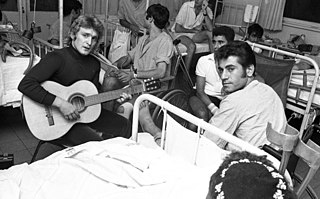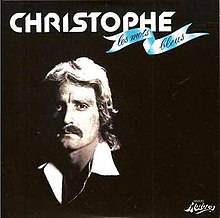
Jean-Michel André Jarre is a French composer, performer and record producer. He is a pioneer in the electronic, ambient and new-age genres, and is known for organising outdoor spectacles featuring his music, accompanied by vast laser displays, large projections and fireworks.

Oxygène is the second studio album by French electronic musician and composer Jean-Michel Jarre. It was first released in France in December 1976 by Disques Motors, and distributed internationally in 1977 by Polydor Records. Jarre recorded the album in a makeshift studio that he set up in his apartment in Paris, using a variety of analog and digital synthesizers, and other electronic instruments and effects.

Jacques Dutronc is a French singer, songwriter, guitarist, composer, and actor. Some of Dutronc's best-known hits include "Il est cinq heures, Paris s'éveille", "Le Responsable", and "Les Cactus".
French rock is a form of rock music produced in France, primarily with lyrics in the French language.

Les Chants Magnétiques is the fifth studio album by French electronic musician and composer Jean-Michel Jarre, released on Disques Dreyfus on 20 May 1981. The album reached number six in the United Kingdom, number 98 in the United States and number 76 in Australia.

Métamorphoses is the thirteenth studio album by French electronic musician and composer Jean-Michel Jarre, released by Sony Music in 1999, Epic Records on January 24, 2000 and by Disques Dreyfus on May 25, 2004 in the U.S. The album was followed by two singles: "C'est la Vie" and "Tout Est Bleu".

En attendant Cousteau is the tenth studio album by French electronic musician and composer Jean-Michel Jarre, released on Disques Dreyfus, licensed to Polydor. The title is a reference to the play Waiting for Godot.

Chronologie is the eleventh studio album by French electronic musician and composer Jean-Michel Jarre, and was released on Disques Dreyfus with license to Polydor in 1993. Chronologie peaked at Number 11 in the UK charts and the album cover art was created by long-time collaborator Michel Granger.

Alain Bashung was a French singer, songwriter and actor. Credited with reviving the French chanson in "a time of French musical turmoil", he is often regarded as the most important French rock musician after Serge Gainsbourg. He rose to prominence in the early 1980s with hit songs such as "Gaby oh Gaby" and "Vertige de l'amour", and later had a string of hit records from the 1990s onward, such as "Osez Joséphine", "Ma petite entreprise" and "La nuit je mens". He has had an influence on many later French artists, and is the most awarded artist in the Victoires de la Musique history with 12 victories obtained throughout his career.
Dreyfus Records is a record label which released the work of artists such as Jean-Michel Jarre who was part of the label for more than 20 years.
Victoires de la Musique are an annual French award ceremony where the Victoire accolade is delivered by the French Ministry of Culture to recognize outstanding achievement in the music industry. The classical and jazz versions are the Victoires de la musique classique and Victoires du Jazz.
The Grand Prix du Disque for French Song is one of a number of prizes awarded by L'Académie Charles Cros as part of the yearly Grand Prix du Disque. The following is a partial list of winners :

L'Imprudence(The Imprudence) is the eleventh studio album by French singer-songwriter Alain Bashung, issued in October 2002 on Barclay Records.

Bleu pétrole(Petrol blue) is the twelfth studio album by the French rocker Alain Bashung, released in March 2008 on Barclay Records. It was the last studio album released during his lifetime.

Daniel Bevilacqua, better known by the stage name Christophe, was a French singer and songwriter. He was born in the Paris suburb of Juvisy-sur-Orge, to an Italian father.
"Les Paradis perdus" is a 1973 French song by Christophe, written by Christophe and Jean Michel Jarre. It reached no.20 on the French charts.
Chloé Mons is a French actress and singer.

Intime is a live album by Christophe from 2014. His third live album, it was the first to reinterpret some of his greatest hits including 1965's hits "Aline and "Les Marionnettes", and 1974's "Señorita", in acoustic versions.

Dominique Perrier was a French electronic musician, composer, and film director. He often accompanied Jean-Michel Jarre onstage and was an important figure in the groups Space Art and Stone Age.

"Où sont les femmes ?" is a 1977 disco hit by Swiss singer Patrick Juvet. The song was composed by Juvet with lyrics by Jean-Michel Jarre, who also produced the track. It is considered one of the first French-language disco songs and the first to make it into the disco charts. It peaked at number one in Quebec, number two in Switzerland, number five in Wallonia and number six in France. It has gone on to sell over 250 thousand copies in France.














